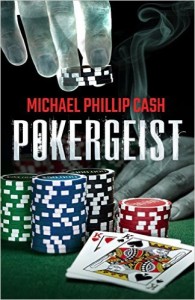
Michael Phillip Cash
July 2015
Reviewed by Michael R. Collings
Clutch Henderson has one ambition in life: to win the golden bracelet at the International Series of Poker in Las Vegas and thereby prove to himself that he is the best player in the world and show his long-dead grandfather that he is not a loser. At seventy, he has come close several times but never quite made it. Finally, though, he has a chance to win against an unknown, a neophyte aptly named Adam “The Ant” Antonowski. It all comes down to a single play.
He loses (don’t worry; this is not a spoiler. It happens in the prologue.).
Unfortunately for him—and for a hapless, uniquely bad poker enthusiast but genuinely all-around good guy named Telly Martin—Clutch Henderson has one ambition in death: to win the golden bracelet at the International Series of Poker in Las Vegas, and thereby prove to himself that he is the best player in the world and show his long-dead grandfather that he is not a loser.
All he has to do is convince an unwilling Telly to go along with the scheme at the next International Poker Series. Telly might love poker, but he has his doubts about cheating to win. And there is the small additional problem (common to the companions of unhappy ghosts throughout literature) of being the only person who can see or hear Clutch. A poker player who constantly talks to himself—and talks nonsense at that—is not likely to have an easy time at the tables.
Telly’s life is further complicated by an intricate set of relationships that shift throughout the course of Pokergeist. His fiancée loves him but doesn’t know whether she can trust him. Her boss is a steroid-pumped sexist determined to break the two up. Telly’s parents are typically over-bearing suburbanites who have set impossibly high standards for their middle child and find the thought of him working as a professional poker player abhorrent. Even a fare Telly picks up during a stint as a cab driver seems intent on making poor nice-guy Telly more confused.
And then there are Clutch’s still-living associations. His wife—an “ex” in all but the legal sense—is suing his common-law wife of ten years over the dregs of his estate. His seventeen-year-old daughter is caught between childhood and womanhood and between her grasping mother and the woman who loved her father…who now might or might not love another man.
Throw in the requisite loan shark, who is going to get his money from wife or mistress, whichever ends up with it, and a dozen other denizens of the less-than-glamorous realities of Las Vegas high life, and what results is a quick, quirky, at times slapstick comedy of ghostly hauntings, human greed (there is a good reason why Clutch is called “Clutch”), aspiring love, easy-come-easy-go abandon, a suitably modern morality play that climaxes in another face-to-face confrontation at the poker table. And in the classical sense, this comedy brings the disparate narrative threads together in a raucous—if not outrageous—moment that, indeed, demonstrates that “All’s Well That Ends Well.”
- Killing Time – Book Review - February 6, 2018
- The Cthulhu Casebooks: Sherlock Holmes and the Miskatonic Monstrosities – Book Review - January 19, 2018
- The Best Horror of the Year, Volume Nine – Book Review - December 19, 2017
- Widow’s Point – Book Review - December 14, 2017
- Sharkantula – Book Review - November 8, 2017
- Cthulhu Deep Down Under – Book Review - October 31, 2017
- When the Night Owl Screams – Book Review - October 30, 2017
- Leviathan: Ghost Rig – Book Review - September 29, 2017
- Cthulhu Blues – Book Review - September 20, 2017
- Snaked: Deep Sea Rising – Book Review - September 4, 2017


